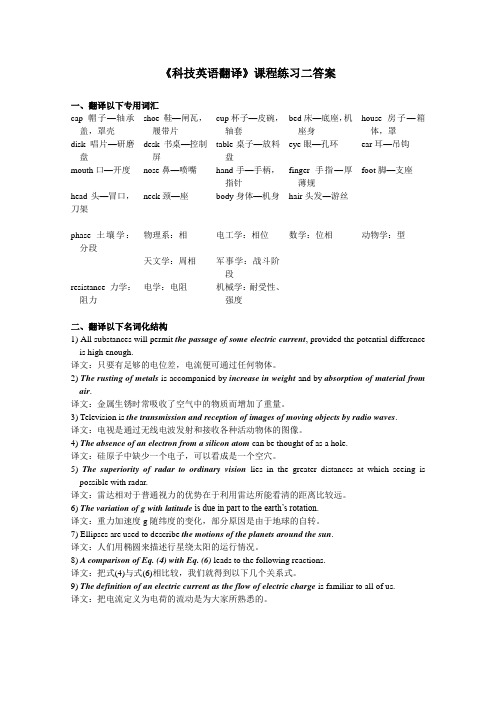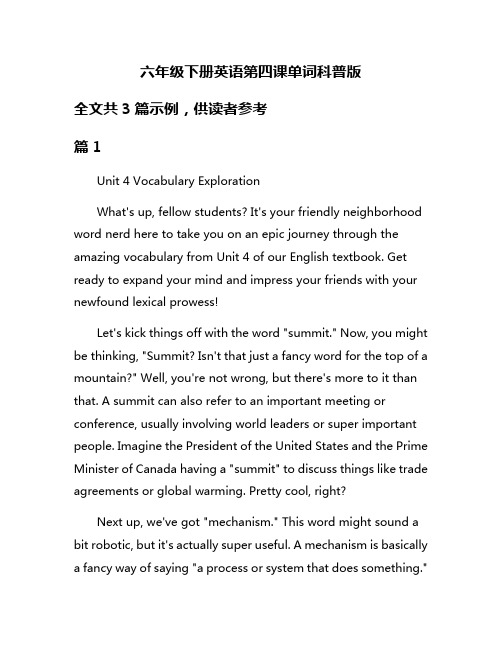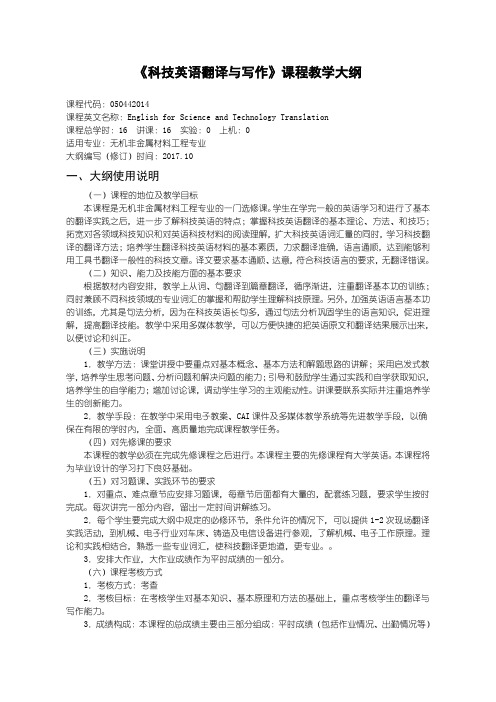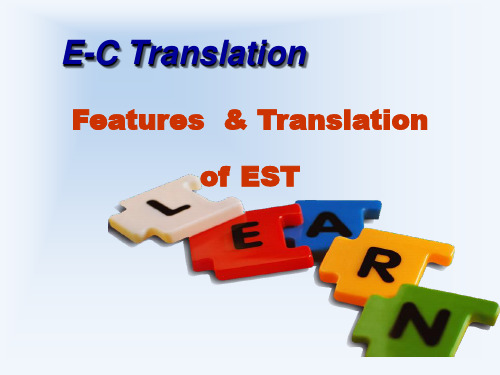第4课:科技英语词汇特点与翻译
《科技英语翻译》课程练习二

《科技英语翻译》课程练习二答案一、翻译以下专用词汇cap帽子—轴承盖,罩壳shoe鞋—闸瓦,履带片cup杯子—皮碗,轴套bed床—底座,机座身house房子—箱体,罩disk唱片—研磨盘desk书桌—控制屏table桌子—放料盘eye眼—孔环ear耳—吊钩mouth口—开度nose鼻—喷嘴hand手—手柄,指针finger手指—厚薄规foot脚—支座head头—冒口,刀架neck颈—座body身体—机身hair头发―游丝phase 土壤学:分段物理系:相电工学:相位数学:位相动物学:型天文学:周相军事学:战斗阶段resistance 力学:阻力电学:电阻机械学:耐受性、强度二、翻译以下名词化结构1) All substances will permit the passage of some electric current, provided the potential difference is high enough.译文:只要有足够的电位差,电流便可通过任何物体。
2) The rusting of metals is accompanied by increase in weight and by absorption of material from air.译文:金属生锈时常吸收了空气中的物质而增加了重量。
3) Television is the transmission and reception of images of moving objects by radio waves.译文:电视是通过无线电波发射和接收各种活动物体的图像。
4) The absence of an electron from a silicon atom can be thought of as a hole.译文:硅原子中缺少一个电子,可以看成是一个空穴。
5) The superiority of radar to ordinary vision lies in the greater distances at which seeing is possible with radar.译文:雷达相对于普通视力的优势在于利用雷达所能看清的距离比较远。
四年级上册科普版第4课单词拼读

四年级上册科普版第4课单词拼读在四年级上册的科普版教材中,第四课主要介绍了一些常见的英语单词以及它们的拼读规则。
单词的拼读是英语学习中非常重要的一部分,它直接关系到学生的阅读和写作能力。
通过学习这些单词的拼读规则,学生可以更准确地拼写单词,提高阅读和写作的效率。
在本文中,我们将对四年级上册科普版第4课单词拼读进行详细的介绍和解析。
一、单音节词的拼读规则1. 单元音字母单元音字母包括a、e、i、o、u。
当它们出现在单词中间时通常由元音字母发音,例如cat(/kæt/), bed(/bed/), big(/bɪg/), hot(/hɒt/), run(/rʌn/)。
2. 辅音字母和元音字母的组合当辅音字母和元音字母组合在一起时,通常由元音字母发音。
a 后面接辅音字母m时,发音为/am/,am; e后面接辅音字母t时,发音为/et/,et; i后面接辅音字母t时,发音为/ɪt/,it; o后面接辅音字母g时,发音为/ɒg/,og; u后面接辅音字母g时,发音为/ʌg/,ug。
二、多音节词的拼读规则1. 长元音和短元音长元音和短元音在多音节词的拼读中非常重要。
长元音通常由两个字母表示,而短元音通常只由一个字母表示。
cake中的a为长元音,发音为/keɪk/; cat中的a为短元音,发音为/kæt/。
2. 辅音字母和元音字母的组合在多音节词中,辅音字母和元音字母的组合不仅要注意元音字母的发音,还要注意辅音字母的发音。
ea组合在一起的时候可以发音为/ɪə/,/eə/,/eɪ/,/æ/,具体的发音还要根据具体情况而定。
三、单词拼读的练习方法1. 阅读练习通过大量的阅读练习,学生可以熟悉单词的拼读规则,培养自己的阅读能力。
2. 拼写练习学生可以通过听音填空、单词拼写等练习来巩固单词的拼读规则,提高自己的拼写能力。
3. 语音练习学生可以通过模仿老师的发音或者录音对比的方式来训练自己的语音,提高自己的发音准确性。
科技英语的特点及翻译技巧

一、科技英语的特点
1、词汇特点
科技英语词汇具有专业性、精确性和简洁性。专业性指的是科技英语中大量使 用专业术语,这些术语通常具有明确的科学含义。精确性是指科技英语词汇的 选用力求准确,避免产生歧义。简洁性则是指科技英语倾向于使用复合词和缩 略词,以减少语言表达的冗余。
2、句法特点
科技英语句子结构通常较为复杂,多使用长句和被动语态。长句能够详细阐述 科学概念和原理,而被动语态则强调了客观性和准确性。此外,科技英语还经 常使用名词化结构(Noun Phrases)和定语从句(Adjective Clauses)等 语法结构,以增加信息的密度和清晰度。
科技英语的特点及翻译技巧
目录
01 一、科技英语的特点
03 参考内容
02
二、科技英语的翻译 技巧
随着全球化的加速和科技的发展,科技英语在当今社会中扮演着越来越重要的 角色。科技英语是一种专门用途英语(ESP),其特点主要表现在词汇、句法 和语境等方面。在翻译科技英语时,了解这些特点并掌握相应的翻译技巧是准 确传达信息的关键。
1、理解专业术语
科技文本中经常出现专业术语,因此理解这些术语是非常重要的。在翻译之前, 你应该了解相关的专业背景知识,以避免误解或误译。如果遇到不确定的术语, 可以查阅相关的专业词典或寻求专业人士强调客观事实。在翻译成中文时,应该尽量保 持这种被动语态的感觉,比如用“被”、“由”等词语来表达。同时,也应该 注意避免使用过多被动语态,以免使文本显得生硬不自然。
总之,科技英语的翻译需要结合其特点,灵活运用各种翻译技巧,以确保信息 的准确传递。通过不断提高自身的专业素养和语言能力,译者可以更好地服务 于读者,促进不同语言之间的科技交流与合作。
参考内容
科技英语翻译是一项重要的语言技能,它需要准确、客观、精练地表达原始信 息。由于科技文本的特殊性,如专业术语、长句、被动语态等,给翻译工作带 来了一定的挑战。以下是一些有用的技巧,可以帮助大家更好地进行科技英语 翻译:
科技英语翻译技巧

4、语篇特点
语篇也就是我们通常所说的篇章,是由一组相 互连贯的句子组成的。语篇的语义结构和语篇 机制,即衔接手段确保了语言由句子组成语篇, 从而形成了一个有机的整体,所以对这一层面 的分析包括了衔接手段和语篇结构。
1. 词汇衔接 词汇的重复出现可以减少语言在传递中产生的歧义,
使读者易于正确地理解作者所要论述的客观事实或复 杂的认识过程,体现了科技英语的准确性。 例:Many stories abort the spread of AIDS are false. You cannot get AIDS working or attending with someone who has the disease. You cannot get it by touching drinking glasses or other objects used by such persons. 2. 逻辑连接 通过逻辑连接手段的运用,读者可以了解句子的语义 联系,甚至可经前句从逻辑上预见后续句的语义,体 现了科技英语的逻辑推理性和严密性。
3
什么是科技英语?
科技英语(English for Science and Technology,简称EST) 是从事科学技术活动时所使用的英语,是英语的一种变 体(科技文体)。科技英语自70年代以来引起了人们的广 泛关注和研究,目前已发展成为一种重要的英语语体。 本节所讨论的科技英语主要指描述、探讨自然科学各专 业的著作、论文、实验报告,科技实用手段(包括仪器、 仪表、机械、工具等)的结构描述和操作说明等。
9
2、修辞特点
使用时态少,多用一般现在时、一般过去时、 一般将来时。
修辞手段单调,很少使用文学英语的修辞手法。 逻辑语法词多,科技英语注重客观事实论述及
六年级下册英语第四课单词科普版

六年级下册英语第四课单词科普版全文共3篇示例,供读者参考篇1Unit 4 Vocabulary ExplorationWhat's up, fellow students? It's your friendly neighborhood word nerd here to take you on an epic journey through the amazing vocabulary from Unit 4 of our English textbook. Get ready to expand your mind and impress your friends with your newfound lexical prowess!Let's kick things off with the word "summit." Now, you might be thinking, "Summit? Isn't that just a fancy word for the top of a mountain?" Well, you're not wrong, but there's more to it than that. A summit can also refer to an important meeting or conference, usually involving world leaders or super important people. Imagine the President of the United States and the Prime Minister of Canada having a "summit" to discuss things like trade agreements or global warming. Pretty cool, right?Next up, we've got "mechanism." This word might sound a bit robotic, but it's actually super useful. A mechanism is basically a fancy way of saying "a process or system that does something."For example, your body has all sorts of mechanisms that keep you alive, like your digestive mechanism that breaks down the food you eat. Or, you could talk about the mechanisms of a clock that make the hands move. Mechanisms are everywhere, keeping the world running smoothly.Now, let's dive into "prosperous." This word is all about success and wealth. If someone or something is prosperous, it means they're doing really well financially. You could say that a prosperous business is making a lot of money and doing great. Or, you could describe a prosperous country as one with a strong economy and plenty of resources. Basically, if something is prosperous, it's living the good life.Moving on, we've got "incessant." This word might look a bit intimidating, but it's actually pretty easy to understand. Incessant means "never-ending" or "continuous." For example, you could describe the incessant rain during a thunderstorm, or the incessant chatter of your little sibling who just won't stop talking. Incessant is one of those words that really drives home the idea of something happening over and over again, without stopping.Next, we've got "excerpt." An excerpt is like a little snippet or piece taken from a larger work. For instance, if you read a short passage from a novel in your English class, that would beconsidered an excerpt from the book. Or, if you watch a clip from a movie or TV show, that's an excerpt from the full production. Excerpts are great for giving you a taste of something without having to experience the whole thing.Now, let's talk about "immerse." To immerse yourself in something means to fully engage with it or become completely involved in it. For example, you might immerse yourself in a good book, getting so caught up in the story that you lose track of time. Or, you could immerse yourself in a new hobby like painting or playing an instrument, dedicating a lot of time and effort to mastering it.Moving right along, we've got "adapt." Adapt is all about making changes or adjustments to fit new circumstances or situations. For instance, animals have to adapt to changes in their environment, like finding new sources of food or shelter. Or, you might have to adapt to a new school by making new friends and adjusting to different rules and routines. Adapting is all about being flexible and rolling with the punches.Next up, we've got "scarce." Something that's scarce is in short supply or hard to find. For example, water can be scarce in certain parts of the world that experience droughts or lack access to clean water sources. Or, you could say that good grades arescarce in your class because everyone finds the material really challenging. Basically, if something is scarce, it's rare and hard to come by.Now, let's explore "consent." Consent is all about giving permission or agreement for something to happen. For instance, if you want to borrow your friend's pen, you need to get their consent first. Or, if you're going to share someone's personal information, you should have their consent to do so. Consent is super important because it shows respect for other people's choices and boundaries.Finally, we've got "violate." To violate something means to break a rule, law, or agreement. For example, if you cheat on a test, you're violating the school's honor code. Or, if you trespass on someone's property without permission, you're violating their property rights. Violating rules or laws can often lead to consequences or punishments, so it's generally a good idea to avoid doing it.Phew, that was quite the vocabulary adventure, wasn't it? But don't worry, fellow word nerds – we've only just scratched the surface of the amazing world of English vocabulary. Keep exploring, keep learning, and keep expanding your mind. Whoknows, maybe one day you'll be the one writing these vocab explorations for future generations of students!篇2Unit 4 Vocabulary ExplorationHey guys! For this unit's vocab words, I thought I'd give you the inside scoop on where these words actually come from and some cool facts about them. Learning vocabulary is way more fun when you know the juicy backstories, right?Let's start with the word "adopt." This one traces back to the Latin word "adoptare" which literally means "to choose for oneself." The Romans used it in a legal context of formally taking someone as your own child. These days we use it for kids or pets, but also for things like adopting a highway to clean up!Then we have "adult." This comes from the Latin "adolescere" meaning "to grow up" or "mature." Funny enough, the Latin root is where we get the word "adolescent" too. An adult is someone who has been through that adolescent phase and (supposedly) become fully mature.What about "behave"? This one has an interesting origin from the Old English "behabban" which meant "to contain, have control over." So to behave literally means to have control orcommand over your own actions. The origins capture that sense of restraint and discipline we associate with good behavior.The word "brave" links back to the Latin "bravus" which just meant "crude, fierce, or defiant." It evolved to describe someone who confronts danger in a fierce, defiant way - our modern understanding of bravery. Funny how a word for rudeness transformed into one for courage!Sticking with cool root origins, "cellphone" traces back to the Latin "cella" meaning a "small room." So our mobile phones started out being named for their small enclosures holding the electrics and batteries. Maybe not the coolest backstory, but it beats me!Now for "checkout." This is actually a new compound word, joining "check" (from the ancient Persian "shah" meaning "king") with the straightforward "out." So checking out is the kingly process of verifying what you've got before leaving, I guess!Next up is "chore." This one comes from t he Greek "χωρα" (khora) literally meaning "this place around here." It came to describe the labor and toils associated with a place - the chores of maintaining it. Who knew our dreaded household tasks had such an unglamorous semantic journey?Then we have "entry," which traces to the French "entrer" meaning to go or come into. So an entry is the way you gain entrance or access to someplace. The noun form highlights that it's not just the act of entering, but the specific means or opening you use.How about "equal"? This one has an elegant Latin root "aequalis" which combines "aequus" (level) with a suffix implying "being in a condition of." To be equal is to be on that same balanced, level plane as someone or something else. Beautifully descriptive!Let's do a couple more... "neighborhood" ultimately comes from combining the words for "near" and "dwelling place." Makes total sense when you think about it as the dwellings situated close together.Finally, "volunteer" has a fascinating backstory. It comes from Latin "voluntarius" meaning "of one's free will." This root gave us words like "volition" and "voluntary." So a volunteer freely chooses of their own volition to offer their services. Knowing that adds character to the word.Whew, I'm all vocabulary-d out for today! See, words can be way more interesting when you peek behind the curtain at their origins and evolutions. I hope getting these kinds of fun factsmade some of these words stickier in your brain. Let me know if you'd like me to vocabulary nerd-out on the next unit too. Peace!篇3Unit 4 Vocab Explained - A Kid's GuideHey guys, it's me again, here to break down all the crazy vocab words we're supposed to memorize for Unit 4 of our English book. I tried to make it fun and use examples you can relate to. Let's get started!Appetite - This one refers to your desire to eat food. Like when you haven't eaten all day and you're starving, you have a big appetite. Or if you just finished Thanksgiving dinner, you probably have zero appetite left!Bland - Something that is bland has no flavor or is just really plain and boring. Like if your mom forgets to put seasoning on the chicken, you might say "Ugh, this chicken is so bland." Opposite of spicy or tasty.Cuisine - This is a fancy word for a style of cooking or the food from a certain culture or region. So you could talk about Mexican cuisine, Chinese cuisine, or even just home-style American cuisine.Delicacy - A delicacy is a rare or expensive food item that is considered a special treat. Like caviar (fish eggs) or truffles (underground mushrooms) would be considered delicacies that rich people eat.Famished - If you're extremely hungry, like you haven't eaten in forever, you could say you're famished. "I'm so famished, I could eat a horse!"Flavorful - The opposite of bland. When something has a really strong, tasty flavor, you could call it flavorful. Your mom's spaghetti sauce is probably flavorful if she loads it up with garlic and herbs.Gobble - To gobble is to eat really quickly without manners, kind of like how a turkey eats! You might gobble down your food if you're in a huge hurry.Munch - This is a fun way to say you're snacking on something, usually foods you can just keep putting in your mouth like chips, popcorn, crackers etc. "I was just munching on some potato chips."Nutrition - This refers to the nutrients in foods that are good for your health and help your body function properly. You learn about nutrition in health class.Palatable - When something is palatable, it means it tastes good and is pleasant to eat. The opposite would be unpalatable, which means gross or disgusting to eat.Picky - A picky eater is someone who is really fussy and only likes certain foods prepared a very specific way. Little kids are often picky eaters.Portion - A portion is how much of a certain food you get, like a portion of fries or a portion of cake. You get larger portions at buffet restaurants.Savor - To savor means to really enjoy and appreciate the flavor of your food by eating it slowly. You savor a delicious homemade meal, not gobble it down.Spicy - A food that is spicy has a hot and intense flavor from ingredients like chili peppers or curry powder. Some people love spicy foods, others can't handle it!Stale - When food has been sitting out too long and has gone dry and lost its freshness, you could say it's stale. Stale bread or chips taste pretty gross.Thirst - Thirst is the feeling of needing or wanting to drink something, usually water, when you're dehydrated. You get thirsty after running around a lot.Zest - Zest refers to how flavorful and intense something tastes. You could say "This lemonade has such a zesty flavor!" Or your food has a real zest or kick to it.Whew, that's all 18 vocab words we had to cover! Hopefully my student-friendly examples make more sense than the definitions in the textbook. Food is something we can all relate to as kids. Let me know if any words still have you starving for a better explanation!。
科技英语翻译与写作---教学大纲

《科技英语翻译与写作》课程教学大纲课程代码:050442014课程英文名称:English for Science and Technology Translation课程总学时:16 讲课:16 实验:0 上机:0适用专业:无机非金属材料工程专业大纲编写(修订)时间:2017.10一、大纲使用说明(一)课程的地位及教学目标本课程是无机非金属材料工程专业的一门选修课。
学生在学完一般的英语学习和进行了基本的翻译实践之后,进一步了解科技英语的特点;掌握科技英语翻译的基本理论、方法、和技巧;拓宽对各领域科技知识和对英语科技材料的阅读理解,扩大科技英语词汇量的同时,学习科技翻译的翻译方法;培养学生翻译科技英语材料的基本素质,力求翻译准确,语言通顺,达到能够利用工具书翻译一般性的科技文章。
译文要求基本通顺、达意,符合科技语言的要求,无翻译错误。
(二)知识、能力及技能方面的基本要求根据教材内容安排,教学上从词、句翻译到篇章翻译,循序渐进,注重翻译基本功的训练;同时兼顾不同科技领域的专业词汇的掌握和帮助学生理解科技原理。
另外,加强英语语言基本功的训练,尤其是句法分析,因为在科技英语长句多,通过句法分析巩固学生的语言知识,促进理解,提高翻译技能。
教学中采用多媒体教学,可以方便快捷的把英语原文和翻译结果展示出来,以便讨论和纠正。
(三)实施说明1.教学方法:课堂讲授中要重点对基本概念、基本方法和解题思路的讲解;采用启发式教学,培养学生思考问题、分析问题和解决问题的能力;引导和鼓励学生通过实践和自学获取知识,培养学生的自学能力;增加讨论课,调动学生学习的主观能动性。
讲课要联系实际并注重培养学生的创新能力。
2.教学手段:在教学中采用电子教案、CAI课件及多媒体教学系统等先进教学手段,以确保在有限的学时内,全面、高质量地完成课程教学任务。
(四)对先修课的要求本课程的教学必须在完成先修课程之后进行。
本课程主要的先修课程有大学英语。
科技英语的特点及译法week 8 week9

"听说有个很好的工作要你去干。"
"挺好的工作"。 "打算干吗?" "不。" "为什么不干?" "不想干"。
Features
这是小说中的一段对说,属于口语文体。其特
点是:用词自由,句法结构简单,短句与省略 句多,自然朴素,生活气息浓厚。
在译文中进一步体现汉语口语的特点,省去主
语 " 你 " 、 " 我 " ; 将 英 语 的 一 个 句 子 I don't think so.干脆译成一个字"不",显得简洁有 力。
科技词汇在科技英语里大量使用,主要包括以下几类:
Vocabulary Features
3. 派生词汇,指通过合成、转化和派生构词手段而构成的词 汇。这种词汇在科技英语文献中占有很大的比重。例如,由 前缀hydro-,hyper-,hypo- 和inter- 构成的词条在科技英语 中就有二干多条;以表示学科的后缀-logy,-ics 和表示行为、 性质、状态等的后缀-tion,-sion,-ance,-ence ,- ment 等 结尾构成的词汇在科技英语文献中俯拾即是。 4. 拉丁语、希腊词素, 是现代科技词汇的主要基础。 5. 动词常用单个动词代替“动词+副词(介词)”如absorb take in; discover find out; assemble put together 6. 缩写词也是科技英语词汇的重要组成部分,具有经济、简 便的优点。maths (mathematics)数学(裁减式缩略词) cpd (compound)化合物 FM(frequency modulation)调频(用首字母组成的缩略词)
大学英语4课后cloze及翻译原题带答案

大学英语4课后cloze及翻译原题带答案大学英语4课后cloze及翻译原题带答案Cloze1In the 21st century, clouds and stormy weather no longer automatically bring operations to a halt or force a change in targets(目标). Technologies such as the Global Positioning System now allow cruise missiles(巡航导弹)and other smart weapons to home in on(瞄准并飞速接近)their targets. But the weather still is a factor that must be reckoned with, especially with precision-guided weapons that must be highly accurate (高度精确)to be effective.Fortunately, the ability to obtain weather forecasts will get better. In the next few years, remote weather sensors(传感器)will grow rapidly on unmanned vehicles. This will create a network of observing platforms that will give commanders an instant overview of weather inthe battle zone(战场). In some areas you’ll have direct delivery of weather information straight from the computes to black boxes in aircraft and other vehicles. That will be especially important for target-bound aircraft(瞄准目标的飞行器).Such technology will give whoever possess it a tremendous edge(优势)over their enemy and enable themto use developing weather conditions to their advantage. As we get superior satellites into space, we’ll gain huge advantages i n observing meteorological conditions in denied areas(盲区), where we don’t have people on the ground. And our modeling ability will continue to improve as our computers get more powerful. The past 10 years have witnessed a revolution in ourcommunicationsand computer abilities. It’s exciting to think of what the next 10 years will bring.在第二十一世纪,云层和暴风雨天气不再自动带来业务停顿或迫使目标的变化(目标)。
- 1、下载文档前请自行甄别文档内容的完整性,平台不提供额外的编辑、内容补充、找答案等附加服务。
- 2、"仅部分预览"的文档,不可在线预览部分如存在完整性等问题,可反馈申请退款(可完整预览的文档不适用该条件!)。
- 3、如文档侵犯您的权益,请联系客服反馈,我们会尽快为您处理(人工客服工作时间:9:00-18:30)。
2. Translation of Compound
Most of such compound words may be translated literally, Sometimes, however, there are exceptions. For example, bull’s eye ( 靶心),cat-and-mouse( 航向与指挥 的),dog house (高频高压电源屏蔽罩),etc.literal translation in tackling such terms may lead astray. Therefore whenever we are confronted with unfamiliar terms and are not sure of their meaning, we should frequently consult dictionaries of relevant specialties. In many cases some additional explanations are needed to make the original meaning clear and accurate.
•
2. 2合成法(compounding)
Two or more words combined t form a new word is called compounding. English technical terms formed by compounding generally take three forms:
3. Acronyms
• • •
Sometimes, an acronym happens to be an actual English word, or it may possess more than one meaning. In this case, special attention should be paid to pick out the right equivalent in Chinese. Mouse minimum orbital unmanned satellite of the earth (仪表载重 50 攻击以下的)不在人的最小人造地球 卫星 SALT Strategic Arms Limitation Talks限制战略武器会谈 SNAP subsystem for nuclear auxiliary power辅助原子核动力 系统 space nuclear auxiliary power空间核辅助能源 systems for nuclear auxiliary power辅助核动力系统
3. Acronyms
An acronym is a word formed from the initials or other parts of several words. Acronyms are widely accepted to coin English technical terms. With the rapid development of science and technology, more and more acronyms are being extensively use in various fields. Simple and brief, acronyms sometimes tend to cause ambiguity in meaning. Therefore, it is up to the translator to discern their actual meaning in different contexts.
e.g.
复合名词: bar code,information highways, heat wave, toothpick,acid cloud,cold fusion, pocket office 复合形容词: nuclear-weapon-free areas point-to-point 点到点 easy-to-use 易用的 plug-to-plug即插即用 复合动词: to mass-produce, to window-dress, to globe trot,to air-condition,to handBesides prefix and suffix of English origin, there are some foreign borrowings, noticeably the Latin ones, e.g. bio-(生物, 生命), thermo-(热), electro-(电), aero-(空气), carbo-(碳), hydro-(水) , -ite(矿物), -mania(热,狂), etc. If we are familiar with these prefixes and suffixes, many technical terms of such formation can be translated appropriately.
2. 通过构词法(Word formation)
2. 1词缀法(affixation) Affixation is an important means of coining new English words and technical terms, with prefix and suffix as inseparable elements of the words being coined. The advantage of affixation is evident: it is the most flexible means of forming new words and its potential of creation is almost boundless, therefore it is extensively used in the formation of technical terms.
1. Affixation/derivation
The following are some typical examples. • miniultrasonicprober = mini +ultra + sonic + prober 微型超 声波金属探伤仪 • macrospacetransship = macro + space + trans + ship巨型 空间转运飞船 • teletypesetter = tele + type + setter 电传排字机 • bathythermograph = bathy + thermo + graph 海水测温仪 • barothermograph = baro + thermo + graph 气压温度记录 器 • deoxyribonucleic = de + oxy + ribo + nucleic 脱氧核糖核的 • photomorphogenesis = photo + morpho + genesis 光形态 11 发生
EST专业词汇的构成
专业词汇的构成
派生词 (derivation) 复合词 (compounding) 混成词 (blending) 缩略词 (shortening)
借用词 缩写
前缀
后缀
压缩和省略
计算机专业英语
2-6
1.借用外来语(Borrowing)
大部分科技英语词汇来源于外来语,特 别是一些新出现的科技术语(以及由它们派生 的形容词)经常借用其它语言的词汇。其中拉 丁语、希腊语对科技英语词汇的影响源远流 长。现代科学技术一方面仍直接从拉丁语、 希腊语借用术语,而另一方面又利用拉丁语、 希腊语的词根,加上英语、拉丁语、希腊语 的词缀构成无穷无尽的科技词汇。 e.g. science & technology acoustics,aerodynamics ambulance, acupuncture
除此以外,英语科技词汇还不断从其它语 言借用,来丰富、发展自己。 e.g. 借自汉语的有: typhoon(台风), suan-pan(算盘) 借自法语的有: chiffon(雪纺稠或薄稠); plateau(高原) 借自波斯语的有: shawl(披肩),bazaar(市场); 借自印地语的有: nabob(大富翁); 借自意大利语的有: fresco(壁画); 借自德语的有: anti-body(抗体); blitz (闪电战) 借自西班牙语的有: canyon (峡谷 ), mosquito (蚊子) 借自阿拉伯语的有: algebra(代数), alcohol (酒精)
18
从上述例子可以看出,科技英语中大 量使用复合名词和复合形容词。复合动词 的使用是现代英语中一种比较简练的表现 手段。如果不用复合动词来表达,句子会 冗长拖沓。但复合动词的使用范围有一定 的局限性,不宜任意套用。对这类动词本 身,也要区别对待:有临时性词语,时过境 迁不再使用;有些富于表现力,能比较长期 地保存下来;在翻译过程中,一定要多注意 这些词。
A mastery of them will benefit us a great deal in the translation of EST.
classification of technical words
single words ( robot, internet, etc.), compound forms ( e.g. feedback 反馈, splashdown 溅落,) phrases on-and-off-the-road路面越野两用的, anti-armored-fight-vehicle-missile 反装 甲车导 power-transmission-relay system 送点中继体系,
